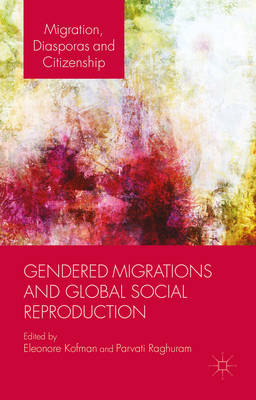Migration, Diasporas and Citizenship
1 total work
Gendered Migrations and Global Social Reproduction
by E. Kofman and P. Raghuram
Published 25 March 2015
Eleonore Kofman and Parvati Raghuram argue that social reproduction offers an insightful lens through which to understand gendered transformations in global patterns of contemporary migration. They suggest that focusing on a range of sites, sectors, and skills beyond those deployed in the literature on care can offer new insights into the relationship between production and reproduction across genders, and how these are being reconfigured in the Global North and South. Drawing on the revived interest in social reproduction in the last few years, Gendered Migrations and Global Social Reproduction suggests that the failure of social reproduction is not only an outcome but also a driver of global migration among different categories of migrants. Moreover, the gendered implications of skill selectivity in immigration regimes, along with class, race and nationality, produce new forms of inequality which influence the ability of individuals and households to benefit from migration and to improve the conditions of social reproduction.
